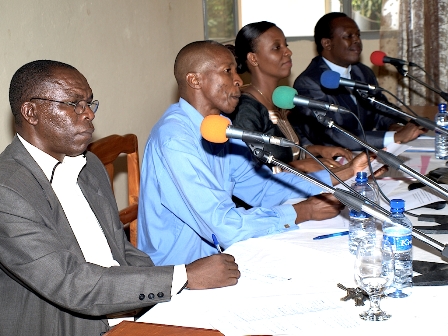Burundi: Coming together to overcome a violent past

Burundi, a country torn apart by eight years of civil war, is working hard to overcome the violence that resulted in more than 300,000 Burundians losing their lives between 1993 and 2005.
Typically Burundians divide along ethnic lines to commemorate their victims. Over the last few months, CENAP has worked with different victim associations to help them overcome their differences and promote the idea of a common commemoration of all victims.
The events of last week are the first time that Burundians have come together to collectively commemorate those they lost in 1993.
Interpeace local partner, Centre of Alert and Conflict Prevention (CENAP) and the association of victims AMEPCI, organized this three day commemoration to unite Burundians to take a critical look at the past so history does not repeat itself.
"It would have been a shame to have lost loved ones and now we just forget about them." - Abbé Emmanuel Gahitu
Burundians were involved from city centre to hill tops and remote mountains
The first day of the commemorations kicked off on Tuesday. A lively radio panel discussion was hosted by five national radio stations. Among the 60 panelists were representatives of political parties, religious leaders, independent analysts and experts in the area of reconciliation.
The beginning of a constructive process
Léonce Ngendakumana, the president of FRODEBU, one of the main opposition parties in Burundi, commented on the progress of the Burundian reconciliation process: “There is my truth, your truth and the common or shared truth. But today we are still at the stage of individual truths.”
An emotional start to the conference
For the following two days Interpeace local partner, CENAP had organized a conference revolving around questions of reconciliation. Libérate Nakimana, CENAP’s Dialogue Coordinator, talked us through the discussions:
“The start of the three days was hard for us all. We were listening to the testimonies that included the tragic events that we all lived through brought to the surface the emotions and losses many of us experienced. But there were also the tales of bravery, of comradeship, of protecting friends and neighbours. These are the foundations from which we can build lasting peace. “
Moving beyond the war that is typically framed as an ethnic conflict
The Burundian Civil War is often framed as a war between ethnic groups. But Father Désiré Yamuremye confirms that it is much more than that. He explains that the outbreak of conflict can be attributed to four root causes:
- Ethnic divisions were created historically and instrumentalized by politicians;
- A hijacking of the 1993 elections;
- The loss of a collective human identity; and
- Impunity, bad governance and a distinct absence of the rule of law.
During the session participants spoke out
Pie Ntakarutimana, from the UN mission’s Transitional Justice Unit, emphasized the importance of the commemoration by saying: “We commemorate in order not to repeat the mistakes from the past”.
Finding the truth was a key theme as well as the need to create secure conditions so people can actually speak out and the truth surrounding past events could be shared.
“Another aspect that I think is of concern is the current insecurity that could stand in the way of discovering the truth,” highlights Ambassador Balthazar Habonimana, the President of the National Council of Bashingantahe. The Bashingantahe is a traditional system of conflict resolution, consisting of a body of local people vested with social, political and judicial power to solve conflicts and keep the peace.
Looking at how to shape the future
Liberate concluded: “The point of this exercise is not to deepen hatred or revive frustration. The whole point of remembering is to think about how this all happened, how we can make sure this never ever happens again and how we can shape a better future for all – together.”
Part of a bigger initiative
CENAP, will be analyzing the feedback and incorporating the findings of the discussions into their work on truth seeking and reconciliation – one of the key issues that came out a nationwide consultation with 2,200 Burundians across the country on obstacles to lasting peace.
